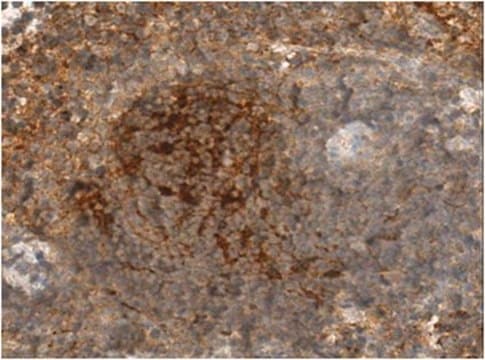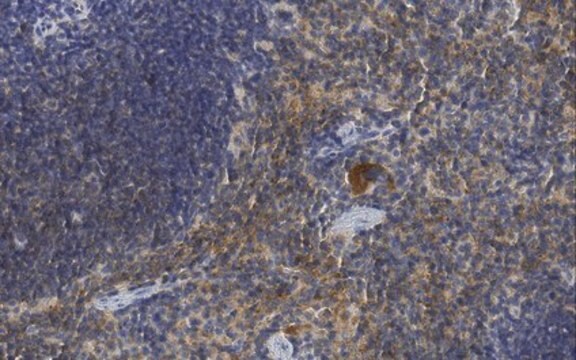MABF2672
Anti-fHbp Antibody, clone JAR 1
About This Item
Productos recomendados
biological source
mouse
Quality Level
conjugate
unconjugated
antibody form
purified antibody
antibody product type
primary antibodies
clone
JAR1, monoclonal
mol wt
calculated mol wt 28.99 kDa
purified by
using protein G
species reactivity
(Neisseria meningitidis)
packaging
antibody small pack of 100 μL
technique(s)
ELISA: suitable
dot blot: suitable
inhibition assay: suitable
western blot: suitable
isotype
IgG3
epitope sequence
C-terminal half
Protein ID accession no.
UniProt accession no.
shipped in
dry ice
target post-translational modification
unmodified
Gene Information
bacterial ... gna1870(2827909)
General description
Specificity
Immunogen
Application
Evaluated by Dot Blot analysis with recombinant fHbp.
DOT Blot Analysis: Various concentrations of recombinant rfHbp 1D1 (variant 1); rfHbp 1D77 (variant 2); and rfHbp 1D28 (variant 3) were probed with Anti-fHbp, clone JAR1 at 1:250 dilution. This antibody specifically detected rfHbp 1D1 (variant 1).
Tested Applications
Inhibition Assay: A representative lot of this antibody inhibited binding of factor H to factor H binding protein (fHbp).(Giuntini, S., et al. (2012). PLoS One. 7(3):e34272).
Western Blotting Analysis: A representative lot detected fHbp in Western Blotting applications (Welsch, J.A., et al. (2004). J Immunol. 172(9):5606-15).
ELISA Analysis: A representative lot detected fHbp in ELISA applications (Welsch, J.A., et al. (2004). J Immunol. 172(9):5606-15; Giuntini, S., et al. (2012). PLoS One. 7(3):e34272; Vu, D.M., et al. (2012). Sci Rep. 2:341).
Note: Actual optimal working dilutions must be determined by end user as specimens, and experimental conditions may vary with the end user
Physical form
Storage and Stability
Other Notes
Disclaimer
¿No encuentra el producto adecuado?
Pruebe nuestro Herramienta de selección de productos.
Storage Class
12 - Non Combustible Liquids
wgk_germany
WGK 2
Certificados de análisis (COA)
Busque Certificados de análisis (COA) introduciendo el número de lote del producto. Los números de lote se encuentran en la etiqueta del producto después de las palabras «Lot» o «Batch»
¿Ya tiene este producto?
Encuentre la documentación para los productos que ha comprado recientemente en la Biblioteca de documentos.
Nuestro equipo de científicos tiene experiencia en todas las áreas de investigación: Ciencias de la vida, Ciencia de los materiales, Síntesis química, Cromatografía, Analítica y muchas otras.
Póngase en contacto con el Servicio técnico








